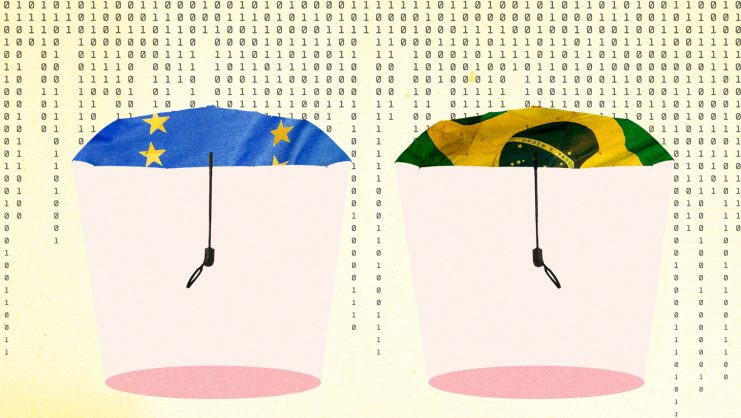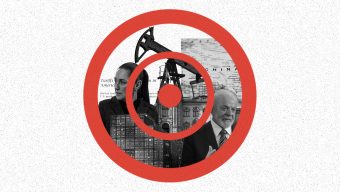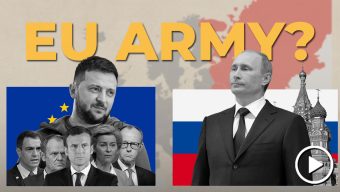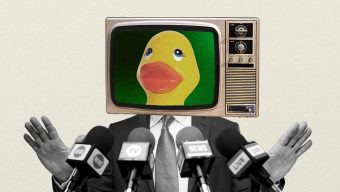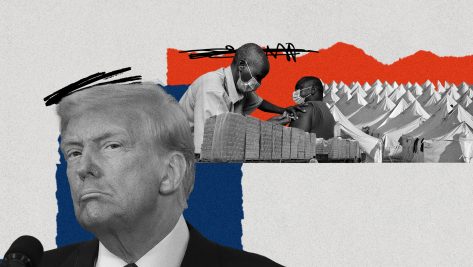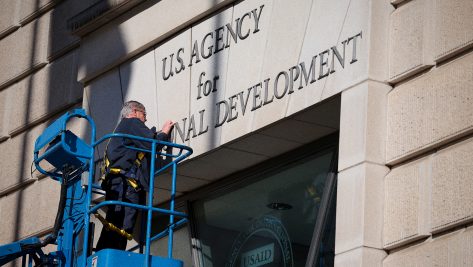In Conversation: Women’s Empowerment with Susana Malcorra and Margot Wallström
Susana Malcorra, Former Foreign Minister of Argentina, sits down with Margot Wallström, Former Minister for Foreign Affairs of Sweden, to discuss female foreign policy, geopolitics, and the importance of women as agents of change in politics.
© IE Insights.
Transcription
Margot Wallström: My name is Margot Wallström. I come from Sweden where I have been politically active for many years. I’ve served in the Swedish parliament, in the government and have also done international service for the United Nations as a Special Representative on Conflict-Related Sexual Violence. And I’m now joining Susana Malcorra on the Global Women Leaders Network.
Susana Malcorra: I am Susana Malcorra, Senior Advisor of IE University, former Dean of the Global and Public Affairs School, former Foreign Minister of Argentina, and former Chief of Staff of the Secretary-General of the United Nations.
Let me start by your tenure as the Foreign Minister of Sweden. You pioneered something that I see as a very, very important policy, which is the feminist foreign policy. What took you to that decision? What made you open the road with that decision?
MW: Well, the most immediate experience was the one from the United Nations. And when we met, also, since I served for a couple of years as the first special representative to deal with the plague of sexual violence as war or a strategy in conflicts. And meeting with all of these women, a majority were women, meeting with them meant that I could better understand the effectiveness of this weapon of war.
I could understand the suffering of these victims. But I could also meet with the determination and the will to be engaged not only or looked at not only as victims, but also as agents of change in their own countries, in their own lives. There can be no peace that is long lasting if women are not engaged, if they are not part of peace processes, if they are not engaged in keeping peace in their countries.
So the full involvement of women, the full empowerment of women is necessary to be successful also with foreign policy. And it belongs in foreign policy because we know that more women means more peace.
SM: Tell me a little bit, you included in your policy, something that I found very, very interesting, which is those three ‘Rs’. What do they mean?
MW: To then say that we will pursue a feminist foreign policy, you have to create sort of the parameters by which we implement such a policy to give our diplomats and all those around the world representing my country a chance to work for it. So I said it would have to follow the three Rs, the rights, representation, and resources. And it meant something very concrete in the end, because rights: do women enjoy the same rights as men? Do they have the right to say “no, I will not be married away when I’m 15”?
I will have the right to go to school as all the boys. Look at Afghanistan now, for example. Do they have a right to open a bank account? Do they have a right to be economically independent? And then to look at representation, meaning are women around the tables where most important decisions are being made? Are they in governments and parliaments?
Are they represented in companies on the boards, for example. And with resources, it has to do with how are resources distributed? Do they go to meeting the needs of girls and women as well? For example, also making gender budgeting. How are women and men affected respectively by the decisions that are made in putting together a budget?
SM: It’s very interesting because you started with the concept that one could say is very high, 30,000 feet high. Then you landed it in your natural way into something very concrete, going from there to budgeting and to aid, how you assign aid, very concrete steps. There are now 10 countries, Spain among them, who have embraced a feminist foreign policy, it’s 10 out of 193 in the United Nations. So this is a movement in the right direction, still a way to go. What could these 10 countries do together to fast track the notion of feminist foreign policy?
MW: Well, I do believe that in the time that we live in now, where we see such a backlash to women’s rights and where the autocrats that decide in so many countries around the world, when they often start by introducing legislation or measures that go against the rights of women, abortion rights is an example in case, I think that those countries that pronounce feminist foreign policy, they should take the lead and maybe come together and say, these are our priorities as the world looks like right now.
These are the things that we really take on ourselves to introduce in our countries. And it has to be the kind of reform. So the kind of structural, practical things that will improve lives for women everywhere. So I think it’s time to step up. The thing is also, how do you measure success in a matter like this? How can we say if we are successful and how do we measure results? And I think that must be part of the discussion between those countries.
SM: You know, it is interesting that you referred to impact and how do you measure success and impact. This has been always the question at the United Nations. I remember being in the field when I was in the humanitarian world and then being in headquarters as Chief of Staff: how to make sure that the interventions that the United Nations was doing made a difference?
You know, how to measure that. And that is the challenge, because many things are intangible but that doesn’t mean not being impactful. So that is something that we need to work on. You said something, Margot, that really struck me. You talk about autocrats. And we know that the world is in many parts, in many regions, this does not exclude any region of the world, in the hands of people who are autocracies, man-led autocracies.
First, we see somehow democracy losing ground. So that’s one aspect of my question to you. But the second one is: how do we associate these to women empowerment? Because it looks like, and you said it, autocrats tend to exclude women even more these days. So what’s your take there?
MW: First also to add to exactly what you said about measuring results, sometimes it can be a sort of a dilemma because when we started to take action against sexual violence as a weapon of war, if women report more of these rapes because they see that there is a chance that they will get reparation or help or that we can end impunity, it will be a paradox because then the number of cases might go up.
But so much is happening in the shadow because women have sort of been carrying the blame also for being raped or sexually abused. So this is why it is indeed very, very complex. And some things can only be measured after many, many years. And we, of course, have to encourage more women to be in politics and to engage as leaders also in a world that carries so many failures to live up to the needs of girls and women as well.
The world today is very complex. To begin with, is totally interconnected. You know, I really don’t like the notion of being against globalization. What is being against globalization? Interconnectedness is what it is. You know, there is no way any single country big or small, can decide that it’s out of this world. There is no way.
SM: And the issues, the challenges we face are also essentially interconnected. Climate change is a big example. Inequality you mention, you know, if we go back to 2015, we could argue that that is a moment where Agenda 2030 was adopted by acclamation by the 193 member states of the United Nations, an agenda that set a way forward with 17 goals.
It really talked about everything. Planet, people, it really embraced the whole notion of what is needed. Also, in 2015, the Paris Agreement was finalized, establishing again, and here by a binding situation, the notion of what needs to be done on climate change. This is only seven years ago and you see the world today. You stand where we are today and it looks like ages ago and it looks like we are moving backwards. What is your sense? Why is this happening?
MW: Let’s talk about education. I think we are rolling backwards also when it comes to education. I think this is also, of course, a reason why some countries find such difficulties in getting rid of poverty or getting out of poverty. So for a democracy to work fully and also for these fantastic goals that we’ve set ourselves to be implemented, people have to understand it.
People have to be able to read and write and grasp what is going on in this world and have access to knowledge, and competence, and the skills to deal with it. So I think we should argue more also about education and look at how we can support better education around the world.
SM: It’s true what you said, that we have lost a bit of sight on education, on our interventions. But it’s also true that we have a generation now that is more educated and has more knowledge, has tools, technological tools, that were not there before. At the same time, often they are more disengaged because, particularly in democratic settings, and we see that again all over the world, in all regions of the world, they don’t see a better future.
They don’t see opportunities in the future that satisfy them. And that means that this cadre of people who are so powerful do not necessarily find the path to be engaged in, and to go into leadership positions, particularly in politics. And so how do we make sure that young people, talented young people, buy this notion that a global citizen is what is needed? And at the same time, how do we broaden that net so more young people have education opportunities?
MW: These are the most difficult questions Susana, and you’re right and I think of my mother because she used to say if you travel through life with education, it is the lightest luggage that you can have. So, please use the opportunity to get a good education. And I still miss you know, I haven’t been to university myself, although I have honorary doctorates from several universities, I have studied all my life, but I have done it as an autodidact. And it’s still kind of a loss to me that this never happened. I came too early into sort of politics and it was never time. But I have studied my whole life and I continue to argue for education as the most important asset to young people. So I don’t have a good answer to your very intelligent question.
SM: Let me go a little bit into geopolitics, Margot. This is a turning point for the world. We have, again, a war in Europe with the invasion of Russia to Ukraine and, you know, having seen crises all over the world, like you and I had the opportunity to see, this back in Europe, with the tools of the 20th century, looks like an impossible situation. How do you see the Ukrainian war impacting the world at large?
MW: It changes everything. It brought us back to the days of both traditional war, of an invasion with two armies sort of on the battlefield. The type of wars that we had started saying belong to the past. We never believed that this would happen in such a way, although the signs were there from the Russian side. But it is also probably the beginning of a new Cold War, where the situation and the position of Russia will determine so much of the relations around the world.
New allies, new power balance where the United States of America will play a lesser role compared to China. But also we look at China as the main competitor and the main sort of partner that they have to relate to in one way or the other. So it upends the geopolitical situation and balance that we have lived with until now.
And it is not an easy equation. It is not easy to see how we are going to deal with this. So it also means that we have a new arms race. That countries, also European countries, invest in buying new arms when they ought to use their money to really deal with climate change, and the environmental problems, and the other security issues that we have to address. And that is also a serious effect.
SM: It is a bit like we are going backwards in the concept of security, a security that was much broader, that had human security at the center. Do you think that is part of the effect?
MW: Yeah, exactly. This is where we were moving slowly and still with, what is it, a total of maybe 50 ongoing wars and conflicts. But they were more and more sort of internal conflicts. They were not between sort of two armies on the battlefield. It was really unruly groups, some of them civilian wars, and they fought with other means as well.
You know, they win wars or lose wars on social media today. That’s how they communicate. And there’s still much violence and much killing. But it was really turning, and we discussed you have to define security in a much broader, much wiser way, because we are also dealing with cyber crime and cyber attacks and other effects and how climate change also affects the security situation.
So I think we now have all of it in a very lethal mix that will take a lot from all of us to try to sort it out, to go back to the arms control deals, to make sure that we can that we can implement some of the things that we have already agreed internationally.
You know, it’s so very interesting what you are saying, because you and I have worked in different parts of the world with wars, civil wars, internal wars, crises that still are there. And all of a sudden, the situation in Ukraine has shadowed most of them. You know, it’s not so long ago that we were working, you and I, were working on extracting women from Afghanistan, you know, because they had to leave, given the situation.
And this was at the front page of all newspapers indicating that the situation in Afghanistan was horrible, you know, winter was coming and famine. And all of a sudden Afghanistan disappeared. And while we are totally concentrated on Ukraine, the Taliban had enacted laws and decrees that are horrible for the Afghans at large, but particularly for women.
And I don’t see a big cry throughout the world, not to talk about Yemen, Syria, Tigray and the many other places where things still go seriously wrong. How is it that we are not able to keep more than one issue at a time?
MW: Yeah, that is absolutely a relevant question and something that I ask myself also over and over again. And we have met, both of us, some of these Afghan women who just feel desperate and they’re saying: what if they were men who suddenly, from one day to another were told to stay home? They could go out only under the supervision of a woman that would accompany them to go to well, just go into the city, that they were not allowed to work any longer as doctors or lawyers or teachers in their community?
And, of course, that their whole life would be and that they would have to cover themselves completely to go out. What if they were men? Wouldn’t the world react in a different place? But this is what happened to Afghan women. Suddenly they were locked up and all of their rights sort of restricted. And girls could no longer go to school.
But this is something that we see over and over again. It’s only when we ourselves feel that “yes, maybe they were right, the researchers who told us that this would be the effect of climate change, that the weather would be much hotter, that we would have extreme weather events, that we would have forest fires and all of these monsoon rains and what have you over and over again.”
So now we feel it on our skin, and that’s the only chance to actually achieve change. We just have to continue to knock on the door to work through media, with contacts with these women and report back to the world that this is also happening at the same time.
You know, when I hear you and hear myself, we give a little bit of a gloom and doom vision of the world. But we have a lot of young people I’m sure in our audience. What could we tell them? Where is the hope? Because at the same time, I have no doubt there are big opportunities. What would you say?
MW: I will give a message. I would say read books, read books because you will understand that learning from history, they have also lived through very difficult times, even more difficult than what we are experiencing now, and we were able to get out of it. What did people do? Learn more about how people react, and you will be better prepared to provide leadership if you open your minds and fantasize and use your innovation and your fantasy. And then, I think engage in something close to you but for somebody else, because we are good at taking selfies, but we are not so good at doing something unselfish.
And I think we have to to change that. So if you’re interested in animals, do something to protect animals, do something for people around you that to go to visit an old person that feels lonely or if you care for nature, find a project where you can engage. So something that is for the common good.
SM: I think that one way to give hope to people is to engage, as you said, in unselfish activity and maybe, you know, go to places where people have much less and with much less, do a lot. Sometimes I feel, and as a mother I feel this, that we have given our children a lot of opportunities who take them for granted.
And I think it’s very important to recognize those opportunities, to profit from those opportunities, but at the same time to see how others didn’t have them, and still through a stronger struggle probably, made it. And in seeing that, realize how transformative those opportunities that you had like education can be to the world, to the larger world, not only to yourself or your closest community.
I think that’s very important. Being in the United Nations changed me. I’m a different person, you know, when I started to understand what the ones who have almost nothing still do to get a better life. When I saw a mother in a refugee camp making sure that her children, particularly her girls, were going to school because that will change their future.
I understood that there are transformative actions that can be taken and it is in our hands. So I agree with you. Go beyond your closest cozy space and learn from there and transform that reality.
MW: And it brings meaning to life.
SM: Well, clearly there is a brighter future and clearly it is in the hands of the younger generation. So we can only hope that they will listen to you, that they will have a critical mind, and reading also develops that critical mind, and at the same time they will embrace this notion of global citizenship, which is so important.



